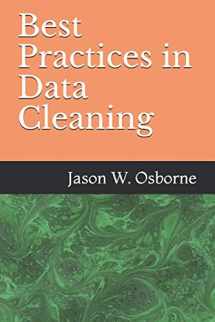
Best Practices in Data Cleaning: Everything you need to do before and after you collect your data (Best Practices in Quantitative Methods)
Book details
Summary
Description
Many researchers jump straight from data collection to data analysis without realizing how analyses and hypothesis tests can go profoundly wrong without clean data. This book provides a clear, step-by-step process to examining and cleaning data in order to decrease error rates and increase both the power and replicability of results. Jason W. Osborne, author of Best Practices in Quantitative Methods (SAGE, 2008) provides easily-implemented suggestions that are research-based and will motivate change in practice by empirically demonstrating for each topic the benefits of following best practices and the potential consequences of not following these guidelines. If your goal is to do the best research you can do, draw conclusions that are most likely to be accurate representations of the population(s) you wish to speak about, and report results that are most likely to be replicated by other researchers, then this basic guidebook is indispensable.


We would LOVE it if you could help us and other readers by reviewing the book
Book review



